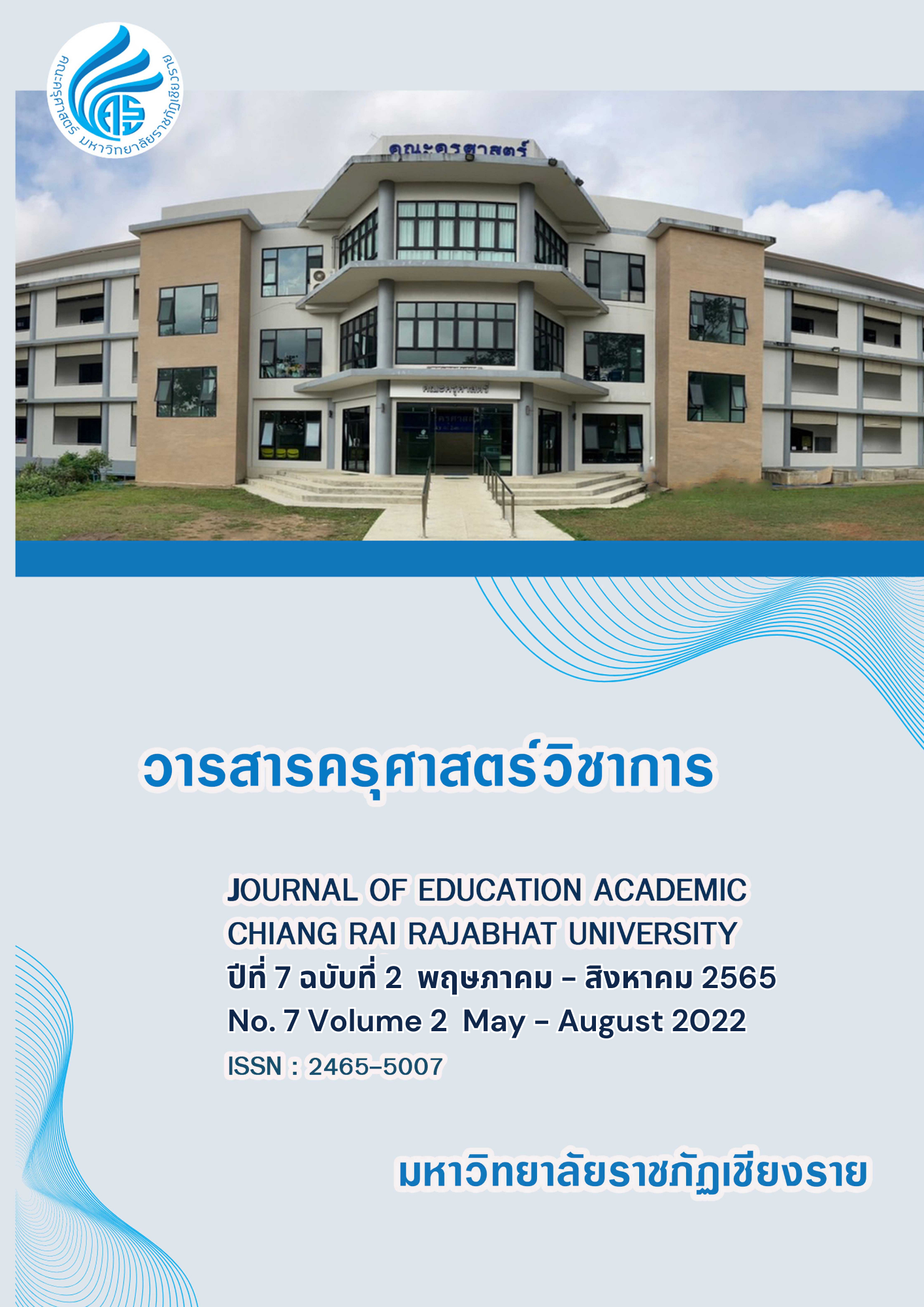Development of Dual Education Administration between Vocational and High School of Rajaprajanugroh 15 School (Wiengkaosaenphuwittayaprasart) for Education 4.0
Keywords:
Development, Education Administration, VocationalAbstract
The objectives of this study were to develop strategies for dual education administration between vocational and high school of Rajaprajanugroh 15 School (Wiengkaosaenphuwittayaprasart) for Education 4.0. The population was 96 participants which included 2 school administrators, 93 teachers and 1 school committee. The research instruments were questionnaire, brainstorming and focus-group discussion. The statistics for data analysis were mean and standard deviation. The results showed that:
The circumstance of curriculum administration regarding quality of learners, in overall, was rated at the high level, desirable characteristics were rated at the high level, reading, writing and analytical thinking were rated at the high level. Curriculum administration and management, in overall, was rated at the highest level. The aspect showing the highest mean was curriculum implementation while curriculum implementation planning was rated the lowest mean. The circumstance on learner-centeredness learning management, in overall, was rated at the highest level. The aspect showing the highest mean was learner-centeredness instructional principles, while the learner-centeredness instructional process was rated the lowest mean. The key factors affecting the curriculum administration were personnel, budget, equipment and administration process. The desirable future scenario regarding quality of learners indicated that learners should be developed for professional competence, core competency, morality, ethics and desirable characteristics. Curriculum administration and management process requires development evaluation, improvement, and revision of curriculum implementation consistently. Also, implementation of technology, media, equipment to support instructional administration and management is required. Learner-centeredness instruction requires individual differences of the learners, learning by doing, using technology in instruction. The strategies for curriculum administration and management indicated that stakeholders shared brainstorming in determining the plan. The project for curriculum administration consisted of vision, mission, goals, and strategic issues in order to mobilize dual education curriculum of vocational and high school at Rajaprajanugroh 15 School (Wiengkaosaenphuwittayaprasart) for Education 4.0. There are 4 strategies.
(1) Empowering learner’s efficiency (2) Empowering understanding of dual education between vocational and high school (3) Developing system of instructional administration and management (4) Developing personnel for excellence. There are 14 projects. (1) Empowering learners (2) Promoting communication skills by using Thai and foreign languages
(3) Empowering technology literacy for learners (4) Promoting morality, ethics and desirable characteristics of learners. (5) Instructional exchange among school networks (6) Advertising dual education program (7) Supporting classroom research (8) Developing curriculum for Education 4.0 (9) Education quality assurance system (10) Instructional supervision (11) Developing teachers and personnel for professional (12) Developing instructional media by using educational technology (13) Research and development of learner-centeredness education (14) Developing information system for instruction.
References
ชลธาร สมาธิ. (2560). การพัฒนาคู่มือการบริหารจัดการศึกษาเรียนร่วมหลักสูตรอาชีวศึกษาและมัธยมศึกษาตอนปลาย (ทวิศึกษา) ของโรงเรียนสบเมยวิทยาคม จังหวัดแม่ฮ่องสอน. (วิทยานิพนธ์ครุศาสตรมหาบัณฑิต). มหาวิทยาลัยราชภัฏเชียงใหม่. เชียงใหม่.
ดวงใจ ไชยลังการ. (2558). แนวทางการบริหารจัดการหลักสูตรสถานศึกษาที่สอดคล้องกับการศึกษาในศตวรรษที่ 21: กรณีโรงเรียนบ้านโป่งน้ำร้อน สังกัดสำนักงานเขตพื้นที่การศึกษาประถมศึกษาเชียงราย เขต 1. (การศึกษาอิสระครุศาสตรมหาบัณฑิต). มหาวิทยาลัยราชภัฏเชียงราย. เชียงราย.
นวรัตน์ รามสูตและบัลลังก์ โรหิตเสถียร. (2559). การศึกษาไทย 4.0 ในบริบทการจัดการศึกษาเพื่อการพัฒนาที่ยั่งยืน ข่าวสำนักงานรัฐมนตรี. สืบค้นเมื่อ 16 ตุลาคม 2563. จาก http://www.moe.go.th/websm/2016/aug/354.html.
สุจิน ใจกระจ่าง. (2553). สภาพการจัดการเรียนการสอนที่เน้นเด็กเป็นสำคัญของโรงเรียนสาธิตมหาวิทยาลัยรามคำแหง. กรุงเทพมหานคร: มหาวิทยาลัยรามคำแหง.
เสาวลักษณ์ พิสิษฐ์ไพบูลย์. (2559). ขับเคลื่อนการศึกษาไทยสู่ไทยแลนด์ 4.0. สืบค้นเมื่อ 14 ตุลาคม 2563. จาก http://www.thaihealth.or.th/Content/33499%-ขับเคลื่อนการศึกษาไทยสู่%ไทยแลนด์%204.0.html
สำนักงานคณะกรรมการการศึกษาขั้นพื้นฐาน. (2553). คู่มือการประเมินสมรรถนะครู. กรุงเทพมหานคร: สำนักงานฯ.
Henry Mintzberg. (1987). Mintzberg on Management: Inside our Strange Worldof Organizations. Italy: Macmillan.
______. (1994). The Rise and Fall of Strategic Planning. New York: Prentice-Hall.
Downloads
Published
Issue
Section
License
Copyright (c) 2022 Journal of Education Academic Chiang Rai Rajabhat University

This work is licensed under a Creative Commons Attribution-NonCommercial-NoDerivatives 4.0 International License.






